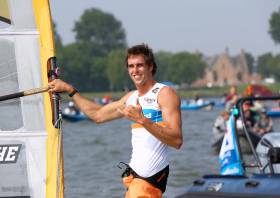Displaying items by tag: Dorian van Rijsselberghe
Windsurfing Champion Hits Out At World Sailing’s Retention Of RS:X For Paris 2024 Without Sea Trials
The dinghy classes are not the only subjects of open letters to World Sailing chiefs as they meet in London this weekend, with Dutch windsurfer Dorian van Rijsselberghe issuing his own missive criticising the retention of the RS:X class without holding sea trials.
Sail World reports on the letter from the current world and Olympic champion in the class, who argues that World Sailing has on its hands “a great opportunity to re-invigorate the sport of sailing and windsurfing and to inspire the next generation” were it to trial alternative classes such as windfoils alongside the RS:X, which itself replaced the Mistral in Beijing 2008.
“Despite the dominant position [my country the Netherlands holds] in the RS:X, I believe it is our duty not only to foster talent and bring it to the top – but in fact that the overriding duty is to act in the best interests of the sport and to ensure its future, prosperity and continued success,” he writes.
Van Rijsselberghe also hit out at the perceived monopoly in manufacturing for the class and is effect on costs for windsurfers, while also highlighting the dearth of youth competitors in the Netherland and New Zealand, historically among the biggest windsurfing nations.
Sail World has much more on the story HERE.






























































